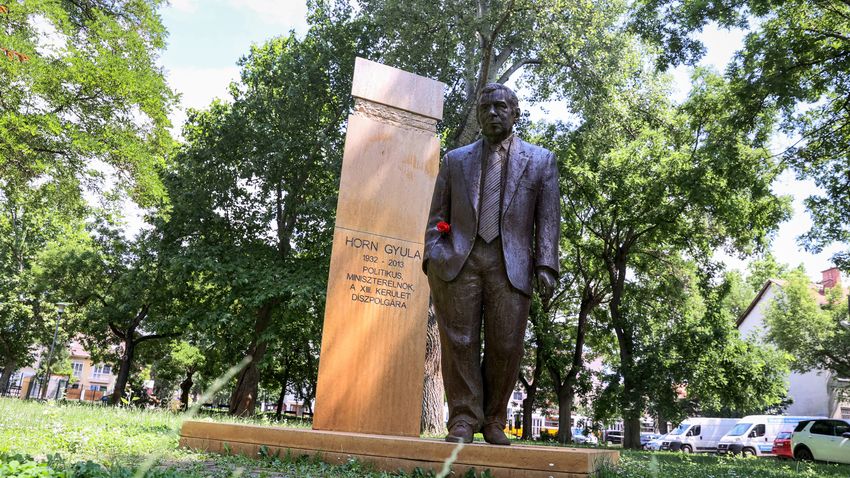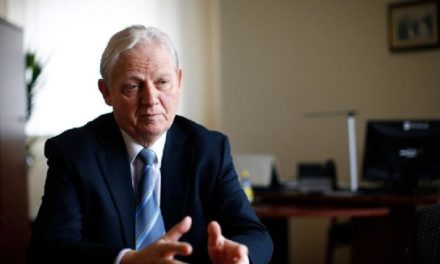We hope that Gyula Horn will be removed from the agenda once and for all as the name of public space - Zoltán Felföldi, the publicist of Magyar Nemzet, pointed out to us. As it turned out, a foundation was needed for the Hungarian Academy of Sciences to take a position on the fact that Gyula Horn participated, and even played a leading role, in the construction and maintenance of the communist autocratic system.
I learned about it from the press in the summer, that the municipal government named a public area after Gyula Horn in the XIII. district - Zoltán Felföldi, the publicist of the MN, brought it to life when we asked.
However, according to the Local Government Act, a person who is XX. participated in the foundation, construction or maintenance of autocratic political systems in the 19th century, it cannot be named as a public area.
The law also stipulates that if doubts arise in this regard during the decision of the local government, the position of the Hungarian Academy of Sciences must be requested. The publicist reiterated that at the June session of the Capital Assembly, representatives of the ruling party expressed their concerns and did not even vote on the proposal, so doubts arose about the name. Despite this, the municipal government of the capital did not request the MTA's position, but no one else could turn to the Academy.
Zoltán Felföldi said: in order to have a document stating that Gyula Horn was the XX. participated in the foundation, construction or maintenance of the autocratic political system of the 19th century, together with another private individual and lawyer Imre Nagy, they jointly initiated the establishment of the Horn Gyula Emlékére Foundation. For this, CLXXXI of 2011. according to the law, they had to request permission to use the name of the MTA.
The MTA refused to grant the permit, according to the reasoning, because
Gyula Horn's "well-known life journey leaves no doubt that he participated in, and even played a leading role in, the 20th century. in the construction and maintenance of an autocratic system in the 19th century".
According to Zoltán Felföldi, it follows from this that not only a non-governmental organization but also a public area cannot be named after Gyula Horn. He emphasized: On the one hand, the Budapest municipality committed a violation of procedural law by not requesting the MTA's position despite the doubts that arose, and on the other hand, it violated the law by naming a public area after a person, which is prohibited by law.
As a result of the procedural violation of the Budapest municipality, there was no MTA statement about Gyula Horn, but now, in connection with the foundation we initiated, there is
Zoltán Felföldi pointed out. As he explained, Imre Nagy, who also participated in the preparation of the founding document of the foundation, as a lawyer, turned to the capital's government office, and they are confident that the government office will either classify the name as illegal, or establish a violation of procedural law, and oblige the capital city government to refer the matter to the MTA to. Which - Zoltán Felföldi trusts in this - can no longer issue a position contrary to the position taken in the case of the naming of the above-mentioned NGO.
We hope that Gyula Horn will be removed from the agenda once and for all as the namesake of public land, he emphasized.
We contacted the capital's government office to find out where the investigation of the request, which is the XIII. it is about the withdrawal of the name of the district promenade named after Gyula Horn. No response has been received by the time we close this page.
It is worth noting that in summer the XIII. In the debate about the name of the district promenade, the leader of the Fidesz-KDNP faction in the capital, Zsolt Wintermantel, suggested that the promenade should not be named after Horn. Gergely Karácsony had an interesting statement at the time: according to the mayor, the Gyula Horn promenade will have, among other things, the important message that "confessed crimes can be forgiven". On the other hand, the former prime minister did not consider his role in the 1956 revolution a sin. "I was an authoritarian, so what?" – the late socialist prime minister described his activities at that time.
2022Plus: Horn's statue from XIII. in the district, it stands on Gyermek tér. Let me remind you of how many children of families became orphans, or their parents were beaten or imprisoned by the authoritarians during the period of retaliation in 1956. The servants of terror were waiting for child-humans to grow up so they could bind them, so how about this now? How can there be a statue of an authoritarian in a square named after children? How can you name a promenade or an NGO after him? How did he become the prime minister of Hungary?
Source and image: Hungarian Nation













